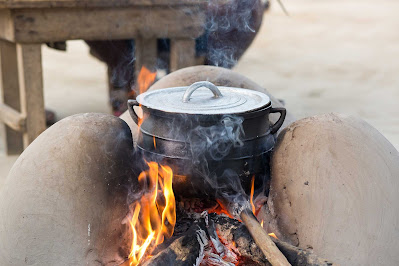From firewood to sunlight—transforming how rural Ghana cooks, one hub at a time.
Introduction:
Welcome to Solar Cooking for All, a community-driven initiative bringing clean, affordable, and culturally appropriate cooking solutions to rural and low-income urban communities in Ghana. Our solar-powered cooking hubs reduce deforestation, improve health, and empower local women—all while harnessing the power of the sun.
🚀 Entrepreneurial Journey
Our Story:
Our journey began with a simple question: Why are so many families still cooking with firewood and charcoal when cleaner alternatives exist?
After visiting several rural communities and speaking with women, youth, and health workers, we realized the issue wasn’t just about technology—it was about access, affordability, and trust.
The Problem:
Over 70% of rural households in Ghana rely on firewood or charcoal for cooking.
This leads to deforestation, indoor air pollution, and respiratory illnesses, especially among women and children.
Cleaner alternatives like LPG are often too expensive, unavailable, or culturally unfamiliar.
💡 Our Solution
Solar-Powered Community Cookers
We build shared, solar-powered cookers, affordable and equipped with:
- Solar cookers and solar-electric hybrid stoves
- Battery storage for cloudy days
- Ventilated cooking shelters
- Water heating and food drying stations
- Training and maintenance support
Benefits:
- Affordable: Shared use lowers costs for families.
- Sustainable: Reduces reliance on wood fuels.
- Culturally Adaptable: Supports traditional cooking methods.
- Empowering: Managed by local women’s cooperatives.
- Educational: Demonstrates clean energy in action.
Implementation Plan:
Partner with local leaders and women’s groups.
Build pilot hubs in 3 rural communities.
Train local technicians for maintenance.
Launch awareness campaigns via radio and schools.
🛠️ Prototype
Milestones Achieved:
- Conducted community needs assessments in 5 districts.
- Built and tested a pilot solar cooker with 10 families.
- Partnered with a local solar tech company for design support.
- Secured seed funding from a clean energy grant.
Adaptations:
- Modified stove design to accommodate large pots.
- Added battery backup for evening cooking.
- Integrated food drying racks for added value.
Analysis
Key components:
Solar Panels for energy generation
Cookers for meal preparation
Battery Storage for cloudy days or evening use
Ventilated Shelter for safe, smoke-free cooking
Water Heating/Food Drying Areas for added utility
🪞 Reflection
Challenges Faced:
Convincing communities to shift from traditional cooking methods.
Designing cookers that meet local cooking needs.
Managing costs while ensuring quality and durability.
Lessons Learned:
Community involvement from the start builds trust and adoption.
Cultural adaptation is as important as technical innovation.
Partnerships with local artisans and women’s groups are key to sustainability.
✅ Conclusion
We’ve built a working prototype, tested it with real users, and refined it based on feedback. Our next steps include:
- Expanding to 3 more communities.
- Securing additional funding and partnerships.
- Launching a full-scale awareness and training campaign.
- Join us in bringing clean, solar-powered cooking to every village in Ghana!






No comments:
Post a Comment